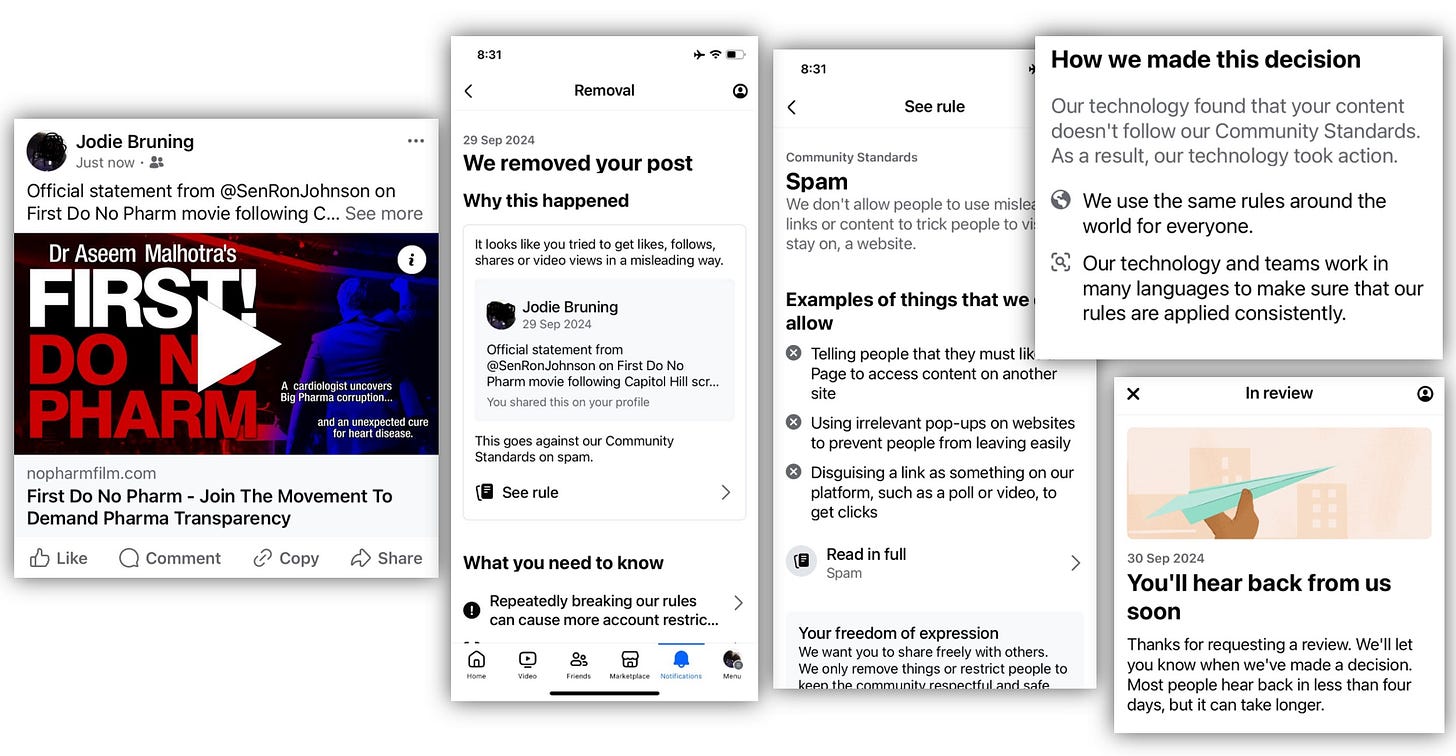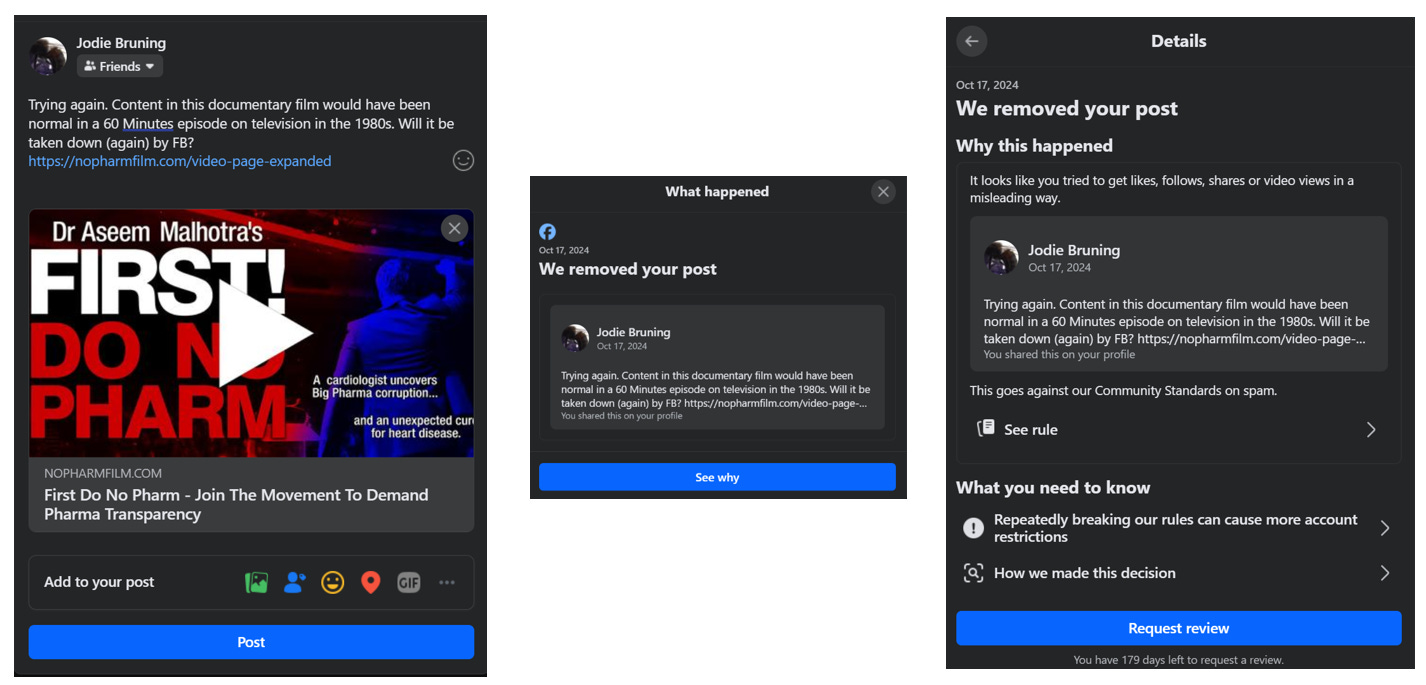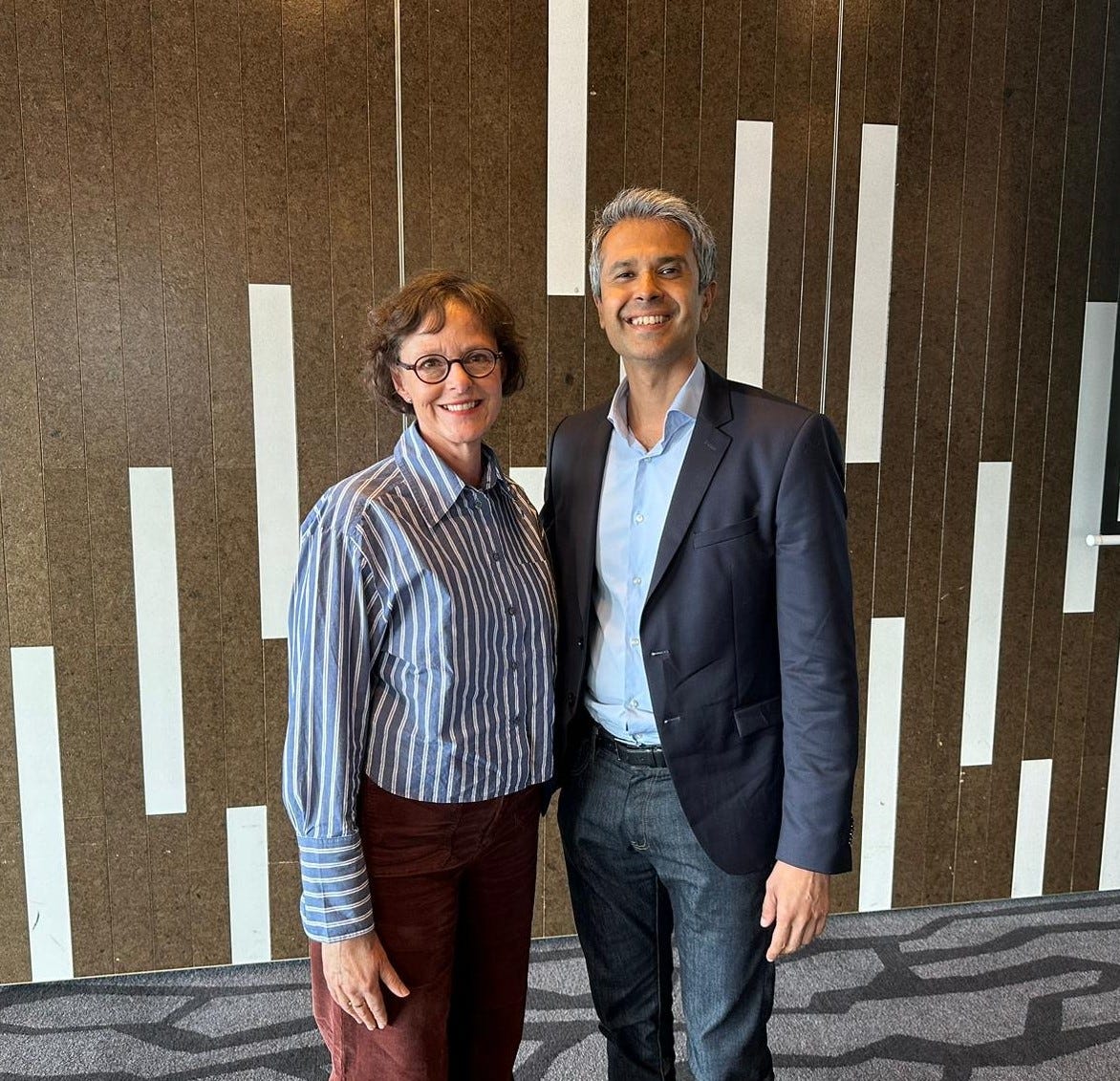Is Facebook protecting Big Pharma?
Why would Facebook be censoring the First Do No Pharm which explores industry influence and power, using the example of statin medication?
Edit. Oct 27, 2024. Not only are you not permitted to post the documentary - you are not permitted to post this Substack talking about the banning of the documentary.
Aseem Malhotra’s new film First Do No Pharm is documentary in style. The type of investigation one might have watched on 60 Minutes in the 1980s. Malhotra interviews patients, people who have been affected by drug harms, and high calibre experts with expertise on medicine and regulatory policy and process.
Cardiologist Malhotra was the darling of UK MSM prior to 2014 when he advocated for lifestyle including dietary interventions to prevent and reverse heart disease, in 2017 releasing the book The Pioppi Diet.
However, in 2014, the position on Malhotra shifted once he joined US doctor John Abramson to question the benefits of routine use of statins for heart disease and the potential misdirection (and here and here) of reducing cholesterol to combat heart disease. In 2019 the UK Mail on Sunday attacked Malhotra and colleagues as ‘statin deniers’ and purveyors of ‘fake news’. In June 2024 Judge Nicklin dismissed the Mail on Sunday’s public interest defence and found in favour of plaintiffs Zoe Harcombe and Malcolm Kendrick in what Nicklin described as ‘the most significant piece of defamation litigation’ that he had observed in a very long time.
(That’s five years of work to reverse a public slur. No wonder academics are silent so often.)
Much of this documentary concerns the statin-as-case-study of what happens when academics, researchers and journals ‘go against the grain’ The challenges to not only advising patients about risks and benefits of drugs, but the challenges to career and reputation that doctors and scientists face when they criticise industry norms and claimed consensus on drug safety and efficacy.
My third-year sociology papers alerted me to the historic problems of medical fraud, medical influence and malfeasance, and iatrogenesis, and I’ve been interested since that time.
Facebook have twice deleted my post on the First Do No Pharm film - which simply discusses long-understood problems, well identified in the scientific literature, of drug industry influence with medical and biologic drug research, marketing and regulation.
I HAVE A FEW QUESTIONS ABOUT FACEBOOK:
Why is Facebook deleting the First Do No Pharm documentary on all continents when it is posted?
Why have I not heard back from two review requests (am I looking in the wrong place)?
I am now concerned that if I post again - if I repeatedly break Facebook’s rules, because I am supposedly going against their Community Standards on Spam - I likely face suspension from Facebook?
Should I trust Facebook anymore? Is this happening to other friends and colleagues?
This, let’s call it overreach, is even happening before (for example) new legislation is passed in Australia that would control Facebook content even more tightly.
I don’t think I am overstating it: If governments and regulators hold predetermined positions on the risk of the technologies that they regulate (which includes drugs and medical devices) - when governments stifle funding for research that could contradict their position on safety, when public media refuse to discuss controversies and slur those who question claims of safety and efficacy - we observe a machinery of government that is deploying policies in a style reminiscent of techno, or medical fascism.
Recently I discussed how Australian government agencies see the opportunity of proposed social media legislation which would enable the government to quickly clamp down on people who criticise the safety of cancer screening and 5G/EMF.
Who might identify harm should harm arise, when the state isn’t interested in identifying harm in the first place (i.e. the funding pathways to research risk pathways aren’t there)? But - Facebook is currently banning a documentary - does it need government help to overreach any further?
FACEBOOK REMOVED - & I HAVE APPEALED
Edit October 27, 2024.
Last night I posted this on my Facebook personal page and my Talking Risk page.
Guess what happened?
How dystopian. You can’t talk about talking about being banned.
Many people are reporting to me that this Substack is being pulled ‘in seconds’.
A HISTORY OF FRAUD & WRONGDOING
It’s increasingly difficult to publicly criticise the biological and pharmaceutical drug industry. This industry is rapacious, and inconvenient data has been hidden, ignored, misrepresented and dismissed in the past.
Eli Lily: In 2009 American pharmaceutical giant Eli Lilly and Company pled guilty and agreed to pay $1.415 billion for promoting its drug Zyprexa (olanzapine, an antipsychotic) for uses not approved by FDA. This included a criminal fine of $515 million, and $800 million in a civil settlement with the federal government and states.
Pfizer: In 2009 Pfizer and subsidiary company Pharmacia & Upjohn Company Inc pled guilty to a felony violation of the Food, Drug and Cosmetic Act for misbranding anti-inflammatory drug Bextra with the intent to defraud or mislead. ‘$2.3 billion, the largest health care fraud settlement in the history of the Department of Justice.’ Criminal fine of $1.3 billion. ‘In addition, Pfizer has agreed to pay $1 billion to resolve allegations under the civil False Claims Act that the company illegally promoted four drugs – Bextra; Geodon, an anti-psychotic drug; Zyvox, an antibiotic; and Lyrica, an anti-epileptic drug – and caused false claims to be submitted to government health care programs for uses that were not medically accepted indications and therefore not covered by those programs.
Purdue Pharma/Sackler Family: Misrepresented OxyContin as non-addictive and safe. Over-prescription then led to overdoses and addiction. $6 billion has been awarded to families. In August 2024, the FDA approved Purdue Pharma’s application for a ‘new auto-injector device used to reverse opioid overdoses’.
GlaxoSmithKline LLC (GSK): In 2012 pled guilty and agreed to pay $3 billion to resolve its criminal and civil liability arising from the company’s unlawful promotion of Paxil, Wellbutrin and Avandia.
GlaxoSmithKline LLC (GSK): October 2024, refused to admit wrongdoing but agreed to pay $3 billion to settle 80,000 lawsuits alleging that ranitidine (ingredient in Zantac) causes cancer when it degraded into the substance NDMA.
Court cases are commencing relating to the mRNA COVID-19 vaccines rollout (and suppression of information: Here, here, here.
Please note, while Malhotra published a book on immune health in 2020, and has written previously on the COVID-19 pandemic response, this is not a focus of the NoPharma film.
MANY PATHWAYS REINFORCE INDUSTRY INFLUENCE & POWER
Iatrogenesis - side effects from drugs, known as adverse drug reactions or ADRs, that have been prescribed by a doctor, and consumed as prescribed.
‘iatrogenic ailments are those where doctors, drugs, diagnostics, hospitals, and other medical institutions act as “pathogens” or “sickening agents.” … “Iatrogenesis is any noxious, unintended, and undesired effect of a drug, which occurs at doses used in humans for prophylaxis, diagnosis, or therapy.” … an ADR as … ‘an undesired effect of a medication that either increases toxicity, decreases desired therapeutic effect, or both. The WHO defined iatrogenesis does not give a clear picture of ADRs. This definition does not include in it the therapeutic failures, intentional and accidental poisoning, drug abuse, incorrect drug administration, and noncompliance. This definition also tends to underestimate ADRs and incidences such as diagnostic procedures which include mechanical and radiological procedures, the therapeutic regimen which includes drugs, surgery, and invasive procedures, hospitalization and treating doctor himself/herself is also not accounted for. That too can cause iatrogenic effects.’
Medical fraud can involve marketing violations such as fraudulent marketing and misbranding, billing fraud and kickbacks; medical research fraud including falsification and fabrication of data and plagiarism. Then there are problems research design (which can shape an answer to suit a purpose) and unfairness in funding.
Then there is the journal problem. Journals can be quick to publish research that might be dubious but that might reflect the interests of the advertisers. As Richard Smith discussed in Medical Journals Are an Extension of the Marketing Arm of Pharmaceutical Companies editors have struggled with this for decades.
A paywalled JAMA paper just out shows just how much peer reviewers for the 4 top medical journals have financial conflicts of interest:
Among nearly 2,000 physician peer reviewers at JAMA, the New England Journal of Medicine, The BMJ, and The Lancet, 58.9% received at least one industry payment during that period,
Medical influence can lead to biased outcomes with industry funders (sponsors) influencing
‘research outcomes, such as by affecting the portfolio’s scope, specific questions asked, experimental design, and choice of principal investigator (PI). It might also bias result reporting, analysis, dissemination, and communication and data availability, reanalysis, and replication.’
Then there is the problem of regulatory capture (discussed at length here in chapter 8). Regulators start to problematise in ways that more closely reflects the interests of the regulated industry. This is more than old school capture with regulators and institutional moving in an out of a so-called revolving door, it’s cultural capture. When fees form a large part of regulatory incomes, regulatory agencies can see their drug sponsors as institutions to service rather than regulate.
People face barriers to getting authorities to recognise harm. Unfortunately, when there are injuries, such as from vaccines and companies have immunity from law suits, harm may not be recognised by authorities, and people compensated, if the injury pathways haven’t been identified.
Then there is the moral and ethical failure to our children. More and more adolescents and children are prescribed drugs at younger ages, locking them into a medical treadmill. Adolescents and children are also subject to drug side effects, such as from antidepressants. They are vulnerable to medicalisation at an early age, for illnesses that could be addressed by remedying social determinants over time.
But it’s more than that, when we believe drugs will fix complex problems, when we don’t dedicate ourselves to addressing environmental drivers which include nutrition, toxicity, and stress, we harm not just ourselves but our children. In a recent book Marty Makary challenges us to look at the Blind Spots in modern medicine, the overuse of medicine, the root causes of disease, the opportunities to improve policy.
MEDICAL NEMESIS
If you’re interested in reading on, Ivan Illich’s classic 1974 book Medical Nemesis gives a language to the problem of medicalisation and pharma/biotech influence that is now 50 years old. Illich argued that environment was the primary driver of health and disease, and that medical dependence was more likely to expropriate health than drive health outcomes.
While improved sanitation, nutrition and antibiotics vastly improved health and reduced death from infectious disease epidemics, as the twentieth century wore on Illich stated, ‘the modern epidemics took over: coronary heart disease, emphysema, bronchitis, obesity, hypertension, cancer (especially of the lungs), arthritis, diabetes, and so-called mental disorders.’
Medicine stepped in as treatments (and promised cures) - but all too often the treatments came with side effects, and the primary drivers were not addressed - placing vulnerable people on a treadmill of medicine. Fifty years ago, Illich stated:
For more than a century, analysis of disease trends has shown that the environment is the primary determinant of the state of general health of any population. Medical geography, the history of diseases, medical anthropology, and the social history of attitudes towards illness have shown that food, water, and air, in correlation with the level of sociopolitical equality and the cultural mechanisms that make it possible to keep the population stable, play the decisive role in determining how healthy grown-ups feel and at what age adults tend to die. As the older causes of disease recede, a new kind of malnutrition is becoming the most rapidly expanding modern epidemic. One-third of humanity survives on a level of undernourishment which would formerly have been lethal, while more and more rich people absorb ever greater amounts of poisons and mutagens in their food.’
When it came to adverse drug events:
‘The pain, dysfunction, disability, and anguish resulting from technical medical intervention now rival the morbidity due to traffic and industrial accidents and even war-related activities, and make the impact of medicine one of the most rapidly spreading epidemics of our time. Among murderous institutional torts, only modern malnutrition injures more people than iatrogenic disease in its various manifestations.’[47]
[47] Martin S. Feldstein, "Hospital Cost Inflation: Study of Nonprofit Price Dynamics," American Economic Review 61 (December 1971): 853-76. For a complementary prediction of a further increase in capital-intensive medicine see Dale L. Hiestand, "Research into Manpower for Health Services," Milbank Memorial Fund Quarterly 44 (October 1966): 146-81
NB: How can families and friends get off the cycle of giving into addictive ultraprocessed food you don’t necessarily want to eat - knowing that it drives poorer metabolic and mental health? Hop over to
or PSGR’s Spotify account to listen to interviews discussing how food addiction can be formally classified and treated.Yes, I have watched the No Pharma film and I recommend it. Yes, I have met Malhotra after the 2023 NZDSOS conference when we were both speakers. I spent a short time with Malhotra discussing not only the impact of dietary changes on metabolic health but on mental health. Transcript of my talk on democracy, institutional failure & justice, available here. Malhotra’s talk was a version of this one.










Jodie, your tenacity and ability to share information in a way that anyone can understand is admirable. Thank you. I love how covid brought more humans like you and many other truth tellers, freedom holders, way showers, peace holders and courageous humans into my world. May we bring humanity back to humans
Yep…it’s been removed!! There you go! Ugh!!